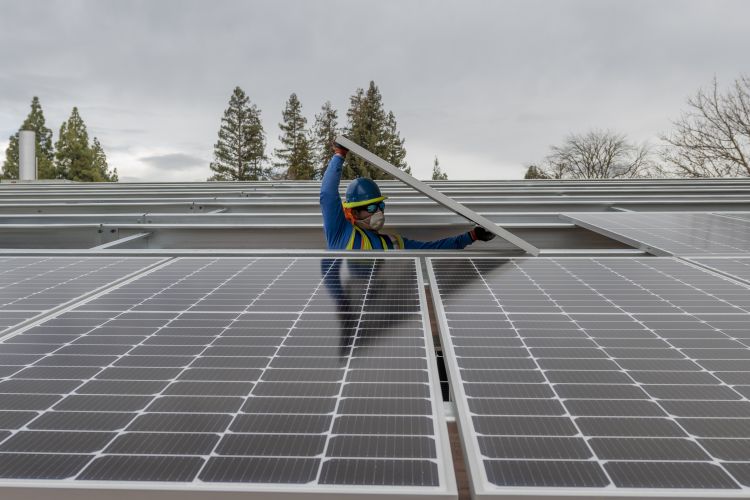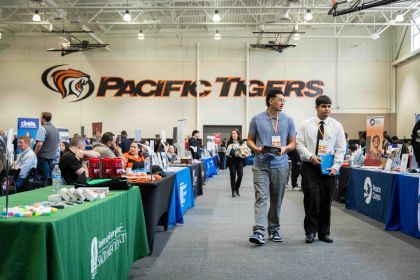Breadcrumb
Major solar initiative puts Pacific among top U.S. campuses for renewable energy

More than 12,000 solar panels were installed over eight parking lots on the Stockton Campus.
A major new solar power initiative at University of the Pacific—to be unveiled this week—puts California’s first university among the nation’s leaders for on-campus renewable energy production.
The solar arrays will generate 30% of the energy needs for the Stockton Campus, making Pacific No. 1 in the country among private universities in campus-based renewable energy creation and in the top five among all universities, according to Sustainability Tracking, Assessment & Rating System reports.
“This puts Pacific on the map for leadership in sustainability,” said Jessica Bilecki, sustainability director at Pacific. “It shows that Pacific lives up to its values for responsibility and citizenship by having renewable energy sources.”
A celebration of the solar initiative will be held this Friday—Earth Day—at 9:30 a.m. on the Alex and Jeri Vereschagin Alumni House lawn.
Pacific worked with Tesla on the installation of solar canopies over eight parking lots on the 175-acre campus.
“We chose Tesla because of the company’s commitment to long-term environmental responsibility and educational benefits to students, such as access to energy-generation data,” Bilecki said. “They are experts in their field.”
The canopies are comprised of more than 12,000 solar panels, which can generate more than five megawatts of electricity with one megawatt of battery storage.
The amount of energy produced by a system of this size prevents an estimated 5,000 metric tons of greenhouse gases each year. That’s the equivalent of removing 1,000 cars from the road.
“We want to reduce our carbon footprint and create a better environment for future generations of Pacific students,” said President Christopher Callahan. “This solar panel project is one of several at Pacific that demonstrates our commitment to being a leader in sustainability.”
Installing the panels over parking lots provides additional benefits for the campus and community. The panels help reduce the urban heat island effect, which results when an urban area has higher temperatures than rural areas. Parking lots are a contributing factor.
New LED lights installed under the solar canopies in the parking lots also produce less heat and reduce nighttime light pollution.
In addition to the solar panels, eight electric vehicle charging stations (16 plugs) are now available in the parking lots, increasing the number of charging stations in the city of Stockton by more than one third.
Other Pacific sustainability initiatives include:
• Ranked among the top 10 in the world for sustainable food and dining practices on college campuses;
• No. 2 in the nation for the percentage of campus-owned vehicles that are 100% electric;
• Using 100% non-potable water for irrigation on the Stockton Campus.





